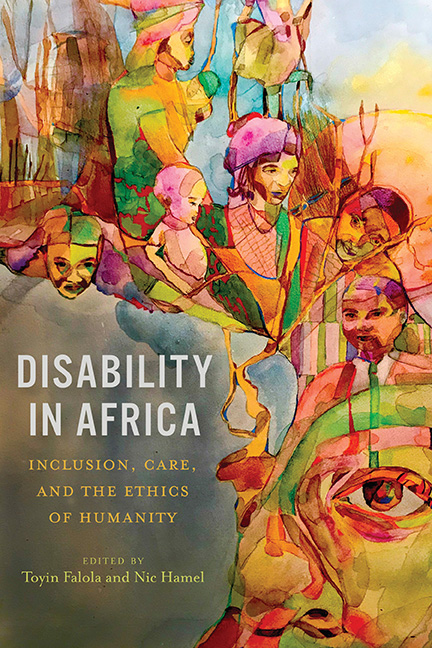Book contents
- Frontmatter
- Dedication
- Contents
- Part One Introducing the Field
- Part Two Theorizing Disability in Africa
- Part Three Representation and Cultural Expressions
- Part Four Education, Community, and Caregiving
- Part Five Activism and Barriers to Inclusion
- Conclusion: A Research Agenda for African Disability Studies
- Selected Bibliography
- Notes on Contributors
- Index
2 - Disability Studies: A Disciplinary Overview
Published online by Cambridge University Press: 17 June 2021
- Frontmatter
- Dedication
- Contents
- Part One Introducing the Field
- Part Two Theorizing Disability in Africa
- Part Three Representation and Cultural Expressions
- Part Four Education, Community, and Caregiving
- Part Five Activism and Barriers to Inclusion
- Conclusion: A Research Agenda for African Disability Studies
- Selected Bibliography
- Notes on Contributors
- Index
Summary
Currently an estimated 15 percent of the global population (or one billion people) are classified as having one or more disabilities, thus making those with disabilities the world's largest minority group. Common characterizations of disability tend to resemble that of the US Centers for Disease Control and Prevention (CDC), which define disability as “any condition of the body or mind (impairment) that makes it more difficult for the person with the condition to do certain activities (activity limitation) and interact with the world around them (participation restrictions).” Under this view, a disability may affect a person's mental health, relationships of various kinds, hearing, thinking, vision, learning, movement, remembering, or communicating. Such definitions, typically referred to as pertaining to the “medical model,” have been roundly denounced by scholars and activists in disability studies (sometimes referred to as “critical disability theory”), for focusing too heavily on the body and mind while largely ignoring disability's various social dimensions. Alternatively, disability studies advocates for a primarily “socio-political-cultural” approach to the concept of disability. This often involves distinguishing between “impairments,” which are conditions that affect the body or mind, and “disabilities,” which are environmental conditions that affect the well-being of people who have (or are thought to have) impairments. Disability activists and scholars frequently emphasize the fluid, contingent, and temporal natures of disability, which are unavoidable for any individual, for long-term aging and exposure to basic life dangers will cause every individual to experience disability at some point. Consequently, before one encounters one's disability, one is often said to be merely “temporarily able-bodied.”
Early scholarship on disability studies adopted the medical/social distinction developed by the 1960s and 1970s activist movements in the United Kingdom and the United States, coining what is called the “social model.” Essentially, the social model makes the claim that disability is a social construction, and therefore when social barriers are removed and universal access is achieved, disability would cease to exist.
- Type
- Chapter
- Information
- Disability in AfricaInclusion, Care, and the Ethics of Humanity, pp. 47 - 72Publisher: Boydell & BrewerPrint publication year: 2021



